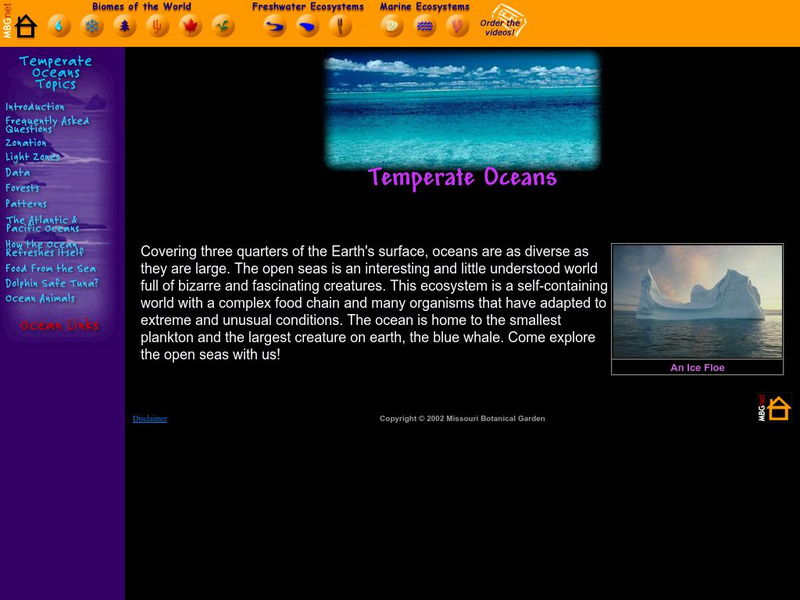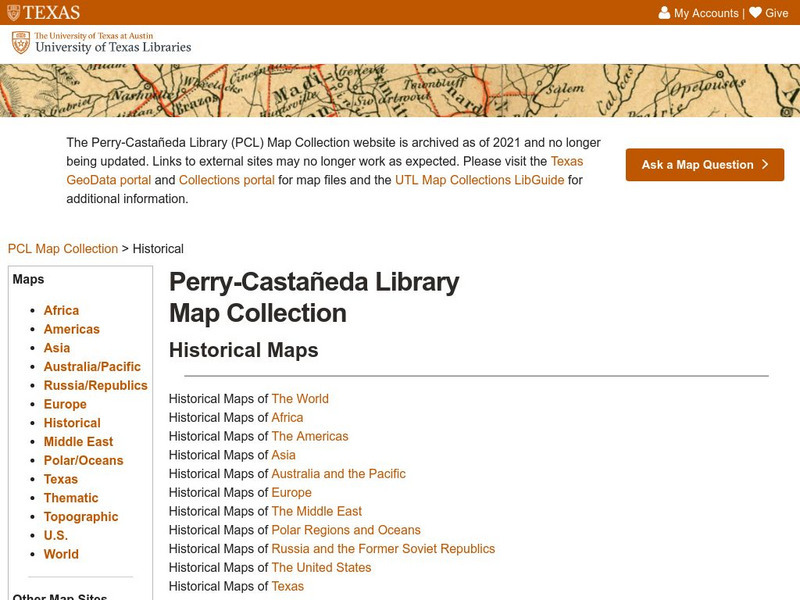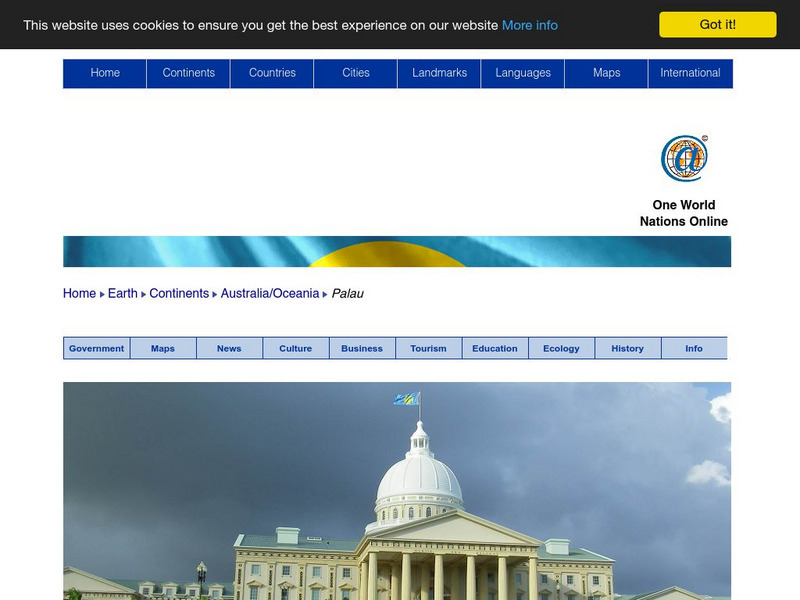Hi, what do you want to do?
Curated OER
The Open Ocean, What is it and How Does it Change?
Students investigate the ocean environment. In this ocean lesson, students discover the physical properties of the ocean. Over two days, students work in small groups investigating ocean maps and creating water currents.
Curated OER
Maps and Globes: Where in the World are We?
Students explore maps and globes. In this introduction to map and globe concepts lesson, students identify features of physical maps, political maps, and globes. Students locate land and water, and recite a poem about the names of the...
Curated OER
Immersion Presents Monterey Bay
Learners study Monterey Bay. In this Monterey Bay lesson, students create a model of upwelling around Monterey Bay. Learners simulate surface water movement relative to prevailing winds.
Curated OER
Pacific Ocean Map Quiz
In this online interactive geography quiz worksheet, students respond to 5 identification questions regarding the Pacific Ocean.
Curated OER
The Galapagos Islands
In this The Galapagos Islands worksheet, students read a 1 page article, answer 3 statements with multiple choice answers, fill in 4 fill in the blank answers and 3 determine if 3 statements are true or false.
Curated OER
Fun with Lewis and Clark
Students are introduced to the Louisiana Purchase and Lewis and Clark's expedition. They are explained that the Peace Medal Nickel, was the first nickel in the Westward Journey Nickel Series.
Curated OER
Earth: The Water Planet
Students elicit data on the water cycle, ocean topography, and island formation in this six lesson unit. The ocean floor and the properties of water are examined through a variety of discussions and hands-on experiments.
Curated OER
La Polynesie Francaise
Students use the internet to research the French Polynesian Islands in the Pacific Ocean. For each website, they scan the information and list five French words they do not know the meaning. They complete a worksheet to discover the...
Curated OER
National Museum of the Pacific War
Young scholars examine the role of science and technology in World War II. They discover how some inventions have changed to meet society's need after the war was over. They visit the museum to complete the lesson.
Missouri Botanical Garden
Missouri Botanical Garden: What's It Like Where You Live? (Oceans)
This site contains a wealth of information. You can click on shorelines, temperate oceans and tropical oceans. Each page contains links to even more information.
Other
Voyages: Scientific Circumnavigations: Dampier
Read about the unlikely journals and observations of William Dampier, an English pirate who sailed the Pacific, making landfall in the Philippines, East Indies, and Australia. See his maps, descriptions of the Pacific, and observations...
Library of Congress
Loc: Country Study: Philippines
The Library of Congress offers a detailed history of the Philippines along with background on such areas as economics, populations, vital statistics, and the like.
Smithsonian Institution
National Museum of Natural History: Ocean Planet
Detailed website that was a companion to a 1995 traveling exhibit of the Smithsonian. Links to lesson plans and other educational materials are at the bottom of the page. Enter the exhibition to explore the world of the ocean.
Other
Journal of the h.m.s. Endeavour: Digital Images
Page by page, this is the manuscript journal of Cook's famous South Pacific voyage. Interactive images allow you to view portions of the manuscript, magnify it, print it and cite it properly.
University Corporation for Atmospheric Research
Ucar: El Nino Teaching Box
This Teaching Box combines readings and activities to build student understanding of the changes that happen during an El Nino event.
Science Education Resource Center at Carleton College
Serc: Detecting El Nino in Sea Surface Temperature Data
Through data analysis and observations of patterns, students learn about normal seasonal sea surface temperature variation as well as extreme variation, as in the case of El Nino and La Nina events, in the equatorial Pacific Ocean.
Missouri Botanical Garden
Missouri Botanical Garden: Fa Qs About Temperate Oceans
Learn why the ocean is blue. Learn the names of the oceans and how they received their names. Learn how the ocean forms waves.
Missouri Botanical Garden
Missouri Botanical Garden: Temperate Oceans
This site from the Missouri Botanical Garden is a comprehensive site covering various topics related to temperate oceans. Be sure to check out the ocean animals link on the left side to learn more about the invertebrates that live in the...
Missouri Botanical Garden
Missouri Botanical Garden: Temperate Oceans
How are the Atlantic and Pacific oceans different? At this site from the Missouri Botanical Garden you can click on the "Atlantic and Pacific Oceans," link to learn all about this topic. Study the two animated illustrations given to...
The Franklin Institute
Missouri Botanical Garden: Ocean Facts
Click on all the links to find out many interesting facts about the ocean. Why is the ocean blue? Why is it salty? Where do most of the animals and plants live? Which ocean is the biggest? The deepest? How much of the Earth is covered by...
University of Texas at Austin
Ut Library Online: Historical Map Collection
This extensive collection from the University of Texas Library Online of detailed maps of many regions of the Earth.
Nations Online Project
Nations Online: Palau
Great reference directory for finding information on the Micronesian island nation of Palau. Content includes background details, a country profile, and numerous links to comprehensive information on the nation's culture, history,...
Nations Online Project
Nations Online: Marshall Islands
Excellent reference source for finding information on the Marshall Islands. Content includes a travel guide, background overview, a country profile, and numerous links to comprehensive information on the islands' culture, history,...
Nations Online Project
Nations Online: Kiribati
A great country profile that takes you on a virtual trip to Kiribati. An overview is given on its art, culture, people, environment, geography, history, economy, and government. There are numerous links available that will provide you...


























